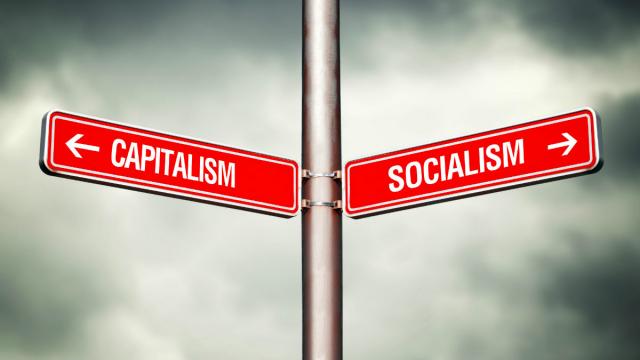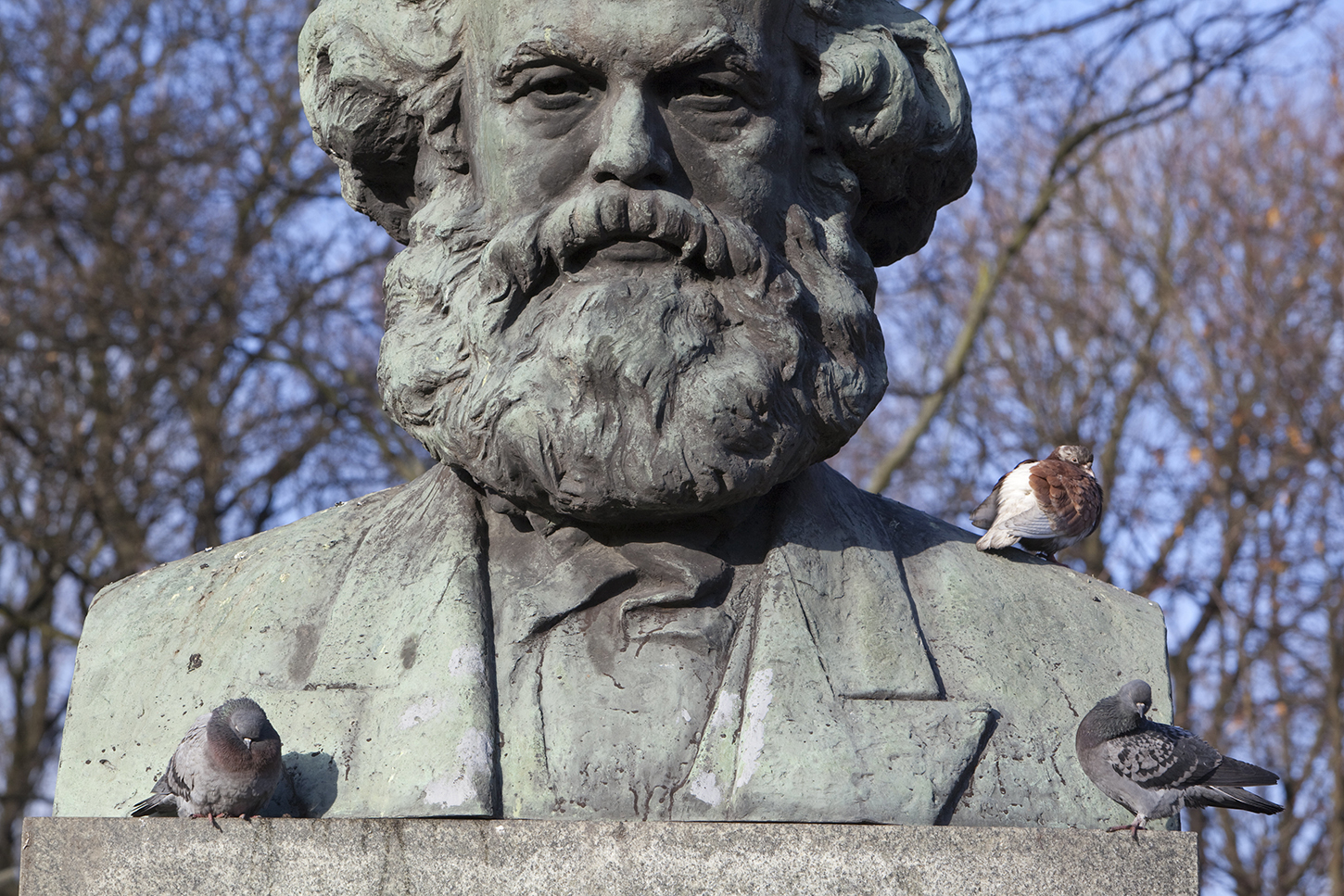
“Socialism” has become the new political buzzword. Sen. Bernie Sanders (I-Vt.) surprised many during his 2016 presidential run by winning the votes of millions as an explicitly “socialist” candidate. In 2018 we’re seeing a rash of candidates running on socialist tickets. Most high-profile of these is Alexandria Ocasio-Cortez, who was propelled into the public eye ― along with her progressive policies like job guarantees and universal, single-payer health care ― following her unexpected victory against veteran incumbent Rep. Joe Crowley in a New York Democratic primary.
In contrast, capitalism, once defended as a seemingly unassailable ideology, is showing deep fractures. While the U.S. economy booms, “workers have been getting ripped off,” a New York Times editorial said in August.
Broadly felt problems with capitalism ― rising inequality, stagnating wages and severe instability ― have led to major global political and cultural shifts. Certainly, this is manifesting itself in the U.K.’s decision to leave Europe, the election of Donald Trump, Italy’s new anti-establishment government and the rise of right-wing populism throughout Europe.
But we can also see this in an increased appetite to seek alternatives to capitalism. A Gallup poll last month looking at U.S. attitudes toward socialism and capitalism said for the first time since the organization started tracking the issue in 2010 that Democrats have a more positive image of socialism than capitalism. Their positive feelings toward capitalism have plummeted.
There’s a problem with this resurgence of interest in socialism, however. People cannot agree on what the term actually means.
Socialism is an economic theory that’s been around since the early 19th century. It gained an increased prominence later that century with the publication of Das Kapital, the critique of capitalism by socialism’s most famous theorist, Karl Marx.
As ideas about socialism took hold and spread, the economic theory has morphed, bending and adapting to different cultures, economies and political systems. People’s interpretations of the true meaning of socialism also started to diverge, as did their theories on how best to make the transition from capitalism to socialism.
Two major ― and clashing ― interpretations have prevailed over others. Both interpretations use the same word, “socialism,” but they give it very different meanings.
Rethink the Whole System
In one camp are those who believe socialism would involve a fundamental change in the structure of our economy, to completely undo our current system’s division of people into categories of employee and employer.
Those who support this interpretation point to Marx’s explanation of capitalism. He wrote that under capitalism, workers ― who make up the vast majority ― produce surpluses. This refers to the value left over after producing goods or services once the costs of production and the amounts needed to sustain the producers are taken into account. In other words, the profit.
Under capitalism, this surplus is immediately taken by the employer, who uses it to reinforce a system where they dominate economically, politically and culturally.
For those who believe socialism means structural change, this relationship would be replaced by a democratic community of people who would produce goods or services. This same community would then collectively own the surplus it produced and democratically decide how to use it. In other words, this scenario involves dismantling the employer/employee relationship.
Capture the State
Others think very differently. As socialism spread quickly during the latter half of the 19th century, across Europe and beyond, many of its advocates were impatient to make the transition from capitalism to socialism. They wanted a strategy, and some socialists, Marx included, provided one: Take control of the state.
Once state power was captured by a coalition of capitalism’s critics and victims, the theory went, it would lead to socialism. The problem with this focus on the state was that it led to considerable confusion over how states and economic systems relate.
Within this state-focused socialism there were two schools of thought. Some believed that once the state was captured, all private business ― previously owned and controlled by private individuals ― should be put into state hands. State officials would hire workers, supervise their work and sell their products and services. The nationalization of industry in Soviet Russia is an example of this thinking.
However, others came to believe that given historical conditions, the most a captured state could do would be to regulate and control private capitalism, which would largely remain in private hands. The goal would be at the very least to protect, and at best to advance, the interests of workers in their endless negotiations and struggles with capitalist employers.
Realism, these thinkers often insisted, placed limits on what could be done. These socialists called their position “social democracy,” or “democratic socialism,” to indicate a progressive, state-regulated private capitalism.
The most visible example of this is in the social democracies of the Scandinavian countries, which practice a gentler, kinder form of capitalism. Also known as the Nordic model, it’s based on national health insurance, subsidized education and transportation, and other policies aimed at social equality.
We Need to Think Bigger
This interpretation of socialism ― the social democracy of the Nordics ― has come to dominate the public debate about socialism. But this misses the bigger picture. It is a limited interpretation of socialism, better characterized as state capitalism, that fails to redraw the oppressive employer/employee relationship.
All the modifications made to capitalism by social democracies were difficult to achieve and remain inherently insecure. First in the U.K. and later to varying degrees across much of Western Europe, strongly social democracies established during the 1930s and 1940s have been weakened and rolled back. Such changes to capitalism fall far short of the more fundamental change required for genuine socialism.
As people argue between conventional capitalism and the gentler capitalism of social democracy, so countries have swung from one to the other. The modern world has repeatedly observed its private capitalist phases accumulate dissatisfied citizens, conflicts and tensions that eventually explode.
When the internal strains and structural problems of private capitalism are felt, for example after the Great Depression of the 1930s, so an era of more state-based capitalism is ushered in, exemplified in the New Deal. And vice versa. Transitions between two forms of the same economic ideology have proved easier to imagine and pursue than a transition to a totally different system.
But these repetitions show that neither transition has solved capitalism’s underlying problems.
Critics of capitalism need to ask themselves a basic question. Is it not time to say Stop, enough, not another oscillation between different ideas of capitalism? We need to bring back from the margins of socialism the perspective that prioritizes transition beyond the employer/employee structure of production.
My vote goes for the democratization of businesses ― for a transition from top-down, hierarchical organization to democratic, worker co-op organization.
This is already being achieved in the Emilia Romagna region of northeast Italy, for example, where worker cooperatives make up more than 40 percent of the economy. The northern Spanish town of Mondragon is home to the Mondragon Cooperative Corporation, the world’s biggest worker cooperative, which has succeeded and grown for half a century. And in California’s Bay Area, the Arizmendi bakeries offer another long-term worker co-op success story.
Transitioning to democratic worker co-op forms like these will be central to our era’s way of going beyond capitalism to something better.















